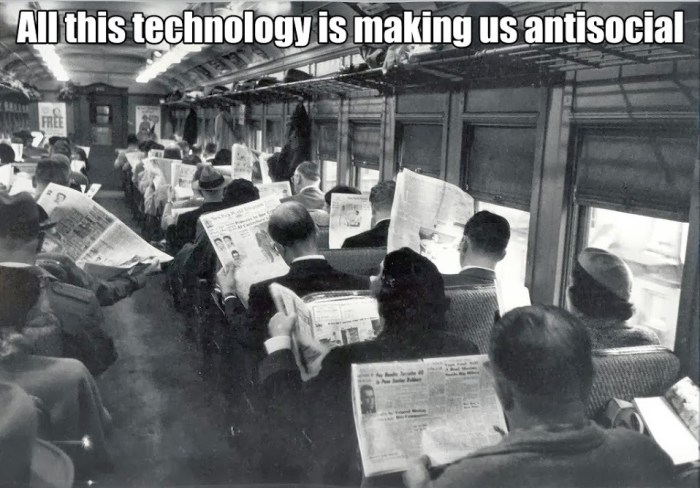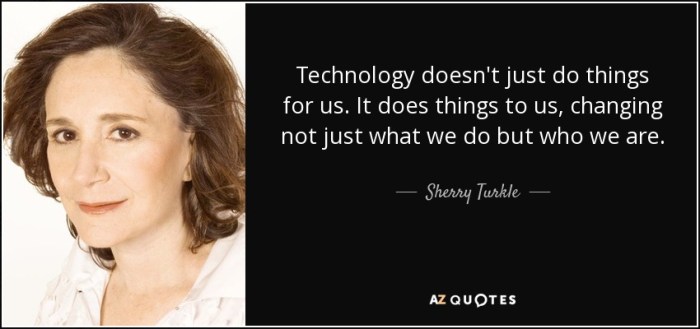Sherry turkle growing up tethered – Sherry Turkle’s concept of “growing up tethered” explores the profound impact of technology on children’s development and socialization in the digital age. This seminal work delves into the challenges and opportunities presented by technology, examining its influence on identity formation, relationships, and education.
As technology becomes an increasingly ubiquitous aspect of young people’s lives, it is crucial to understand its multifaceted effects. Turkle’s research provides valuable insights into the complexities of growing up in a technology-saturated world, offering practical guidance for parents and educators navigating this rapidly evolving landscape.
Sherry Turkle’s Concept of “Growing Up Tethered”

In her influential book “Growing Up Tethered,” Sherry Turkle explores the profound impact of technology on the development and socialization of children and young adults. Turkle argues that children who grow up immersed in digital technologies are “tethered” to their devices, leading to a range of consequences for their cognitive, emotional, and social development.
Turkle’s research has shown that technology can have both positive and negative effects on children’s development. On the one hand, technology can provide children with access to information, educational resources, and opportunities for creativity and self-expression. On the other hand, excessive use of technology can lead to problems with attention, sleep, and social skills.
Turkle also argues that technology can create a sense of isolation and loneliness, as children spend less time interacting with real people and more time interacting with their devices.
The Effects of Technology on Identity and Relationships
Turkle’s research has also explored the ways in which technology shapes children’s self-perception and identity formation. She argues that social media platforms such as Facebook and Instagram can create a false sense of self, as children strive to present an idealized version of themselves to their peers.
This can lead to feelings of inadequacy and anxiety, as children compare themselves to others and feel pressure to conform to unrealistic standards.
Turkle also discusses the impact of social media on peer relationships and social interactions. She argues that social media can lead to a decrease in face-to-face communication, as children spend more time interacting with their peers online. This can lead to problems with social skills development and can make it more difficult for children to form close relationships.
Technology and the Future of Education
Turkle’s work has also examined the role of technology in transforming educational practices and curricula. She argues that technology can be a powerful tool for learning, but it is important to use it in ways that promote critical thinking and problem-solving skills.
Turkle also discusses the potential impact of technology on the development of empathy and compassion, as children spend less time interacting with real people and more time interacting with their devices.
Implications for Parents and Educators, Sherry turkle growing up tethered
Turkle’s research has important implications for parents and educators who are raising and educating children in a technology-saturated world. She provides practical advice on how to navigate the challenges of raising children in a technology-saturated world, such as setting limits on screen time, encouraging face-to-face communication, and promoting critical thinking and problem-solving skills.
FAQ Summary: Sherry Turkle Growing Up Tethered
What are the key ideas behind Sherry Turkle’s concept of “growing up tethered”?
Turkle’s concept emphasizes the impact of technology on children’s development, socialization, and identity formation. She argues that children who grow up with constant access to digital devices experience both benefits and challenges, such as increased connectivity but also potential risks to their privacy and well-being.
How does technology affect children’s self-perception and identity formation?
Technology can shape children’s self-perception and identity formation by providing them with new platforms for self-expression and social interaction. However, it can also lead to increased self-objectification and a preoccupation with online validation.
What are the potential benefits and risks of technology use for fostering or hindering healthy relationships?
Technology can facilitate communication and connection, but it can also hinder face-to-face interactions and lead to cyberbullying and other forms of online harassment. It is important to promote healthy technology use and teach children critical thinking skills to navigate these challenges.


